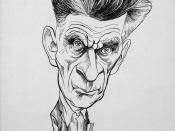The most exciting theatre of the mid-20th century is that of the absurdist, particularly Samuel Beckett, Eugene Ionesco and Jean Genet. They dazzle us, first with a fine control of craft, with the precisely appropriate setting, stage dynamics, and language. Beckett's near-empty landscapes, his reduction of physical movement to a minimum, his sparse, austere and wonderful poetry - all these qualities significantly and largely contributed to the development of the absurdist theatre. The playwrights of this school give us a composite portrait of the contemporary man for whom God is either dead or dying, of the man who sees himself in that strange twilight land between life and death. The characters that they create are in the image of contemporary man who, first, reduced to the faintest hopes, asks the question of what he con do, and then resigns himself to the seeming inevitability of cosmic nothingness. The achievement of the absurdist's school is immense; no other 20th century 'school 'of playwrights has been more theatrically and philosophically effective; none has vividly and deeply represented its age-an age conscious, perhaps above alleles, of life's absurdity.
Absurd literature and drama have gown out of a sense of despair and futility. Some novelists and dramatists have watched life with grave concern and have found that human condition has no color and beauty about it. It is essentially and irredeemably absurd. Albert Camus' The Myth of Sisyphus offers the most extended and precise definition of the word 'absurd'. Camus finds man shifting from nothingness to nothingness -
"In a universe that is suddenly deprived of illusion and of light, man feels stranger. He is an irremediable exileâ¦â¦â¦..This divorce between man and his life, the actor and his setting, truly constitutes the feeling of Absurdity."
R. Mueller and J. Jacobson in their "The...


